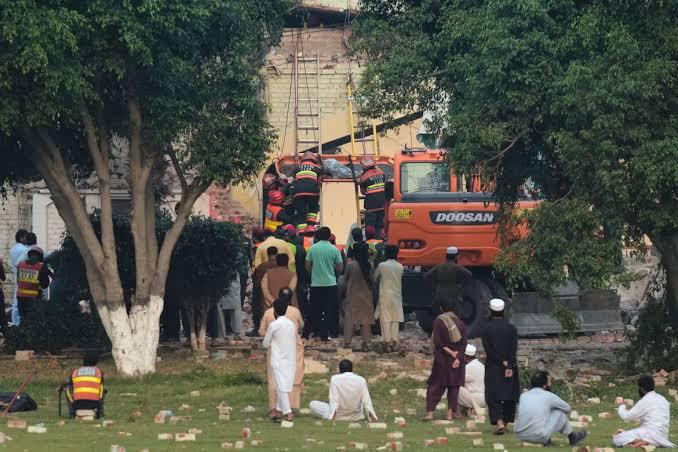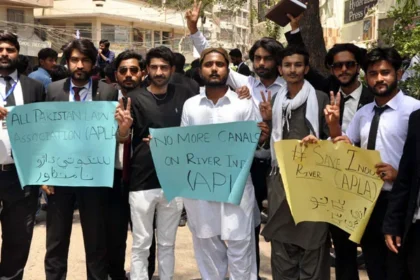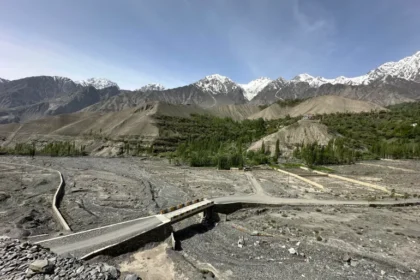The events of last night are proof positive: India still does not possess the ability to dominate Pakistan.
In the minds of the arch-traitors and arch-deceivers to our east and their masses of automatons indoctrinated into the fascist Hindutva ideology, they have attacked and neutralised “terror camps”. The manifest truth on the ground is burnt mosques and wronged mothers.
To draw an analogy with the pathetic Zionist rhetoric surrounding Gaza would be too easy, but one cannot help but feel vindicated upon the assertion that Hindutva and Zionism are sister concerns with regard to their attitude towards Muslims. That the victims of their bloodlust are children matters not an iota, as long as a pound of flesh has been extracted.
I have, I hope, in all my past writings, maintained language that is “once-removed”, if you will. One confesses that this appears to be a Sisyphean prospect on this occasion.
One feels today also vindicated in the assertion of the Two-Nation Theory. One thanks the powers that be that our ancestors had the foresight to divine that coexistence with people to whom martyred children are “potential future terrorists” is not only impossible but would trample upon our dignity and honour. And we are a people who prize both above most things. The constant loyalty checks and abuse heaped upon our Muslim brethren in India make one’s heart rejoice at the establishment of Pakistan.
Perhaps the most jarring (and morbidly amusing) of last night’s events was to behold the sheer vitriol and apocalyptic scale of hatred most of our Hindutva neighbours heap upon each and every one of us. Our neighbours feel immense confidence in their ability to inflict harm upon Pakistan (the words “kill”, “destroy”, and “Pakistan” appearing as a couplet or triplet across all social media).
One almost pities the dogs of war. To be so bereft of civilised thought and emotion must be a state unworthy of humanity. Notwithstanding any moral arguments against war—which, in most cases with a Hindutva interlocutor, amounts to about the same as a pile of scrap—the sheer scale of their indoctrination is betrayed first by the language of genocide, by the rush to war, and by the fact that a large number actually believe they can get away with it.
This piece, therefore, is one’s humble defence of Pakistan’s defence.
Not once—not once throughout the military history of Pakistan—have our Armed Forces suffered a strategic defeat in the theatre of war that currently constitutes Pakistan. Not during ’48, ’65, ’71, Kargil, or any other confrontation. If Pakistan had been handed the burden of a defeat in this theatre of war, there would not be a Line of Control.
India may thump its chest and throw its weight around. It may tell its people Pakistan is a walkover; one knows almost for a fact that not even their military leadership believes that to be the case.
If the three confirmed and two additionally claimed fighter-kills from last night are not argument enough that our Eastern friends are in for a rude awakening if they believe war with Pakistan is a matter of (sick) humour, one is all too happy to provide further context:
The Indian leadership’s supporters seem to forget, in their bloodlust and mad calls to war, that this is a theatre packed full of nuclear-tipped missiles pointed at targets on both sides of the border. Any conflagration between India and Pakistan must by default be limited to a few days and to a medium- to low-intensity conflict. Any further escalation would risk the devastation of M-A-D. That in itself does not consider the fact that Pakistan’s policy is first-use of nuclear weaponry.
Assume for a moment that AJK or GB have fallen into the grip of Modi and all his odious aides’ hateful hands; Pakistani leadership—nay, the Pakistani State as an entity—would lose all credibility, both domestically and internationally, unless a heavy toll is extracted from the occupier. Such a mental exercise is by no means extensive—it is simply meant to dispel some of the more fantastic dreams of our Eastern friends.
An all-out war is made satisfactorily unlikely by the simple fact that both countries could be the ruin of the other, and no other country in the world would like to see that happen.
Operational Reality and National Resolve
Thus, in the context of a localised mid-intensity conflict, one maintains that the Pakistan Armed Forces are at par with the Indian Armed Forces.
It would be easy enough to prattle off an account of the force of numbers that Pakistan would bring to the table; it would also not be very helpful.
The efficacy of our Armed Forces for the purposes of this piece can be determined by three standards:
- Strategic
- Operational
- Tactical
The strategic equation is stalemated. Neither side can inflict a defeat even approaching “crushing” strategic proportions—the reasons for this are elaborated above. Further, we can gauge the success of our strategic planning by measuring if our Armed Forces have kept abreast of technological and doctrinal developments in the theatre.
This, one maintains, we have done. Missiles, air defence, nuclear weapons, cyberwarfare—these are all inductions made by India into our theatre of war; they are all areas where Pakistan now stands confident in its own assets.
The Pakistan Armed Forces maintain operational parity with India in mid-intensity conflicts by fielding comparable weapon platforms such as the Al-Khalid and T-80UD tanks, modernised artillery, attack helicopters, and mobile air defence systems.
Despite India’s numerical edge, Pakistan emphasises quality upgrades and interoperability across mechanised formations. Emphasis on ambush tactics, quick-reaction forces, and integrated infantry-armour operations allows Pakistan to neutralise India’s mass. Familiarity with terrain, battle-tested units, and localised superiority often offset India’s larger force during ground engagements in a mid-intensity conflict.
To my own comrades I say only the following:
Tonight, we stood not as tribes or provinces, not as Shia or Sunni, not as rich or poor. We stood as Pakistan.
They think we will break. That our hearts are hollow, our courage thin. They see our scars and mistake them for weakness. But we are a nation born in fire, in sacrifice, in the dream of Iqbal and the resolve of Jinnah. We do not forget where we come from, and we will never allow anyone to decide where we go.
This war was not of our choosing—but it will be answered. Not with hatred, but with honour. Not with conquest, but with courage. Let the world see: we did not light the match, but we will not burn quietly.
And to the enemy who thinks this nation will kneel—know this: we have bowed only before God, and we will bow to no other.














